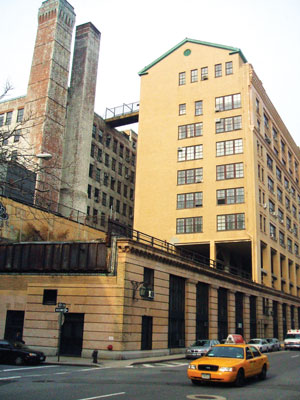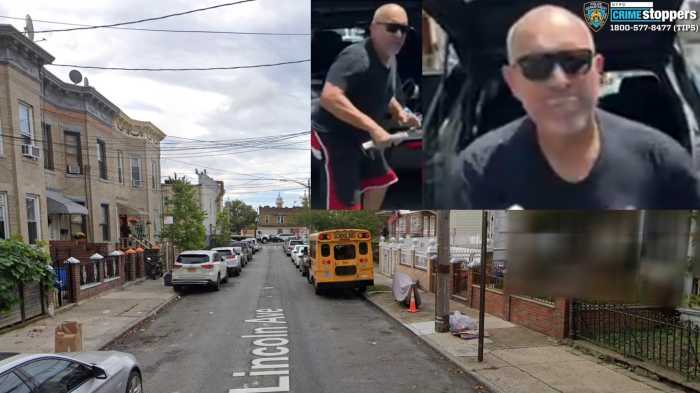
The interconnected complex of old Bell Labs buildings at Westbeth makes for interesting compositions and angles for resident photographer Toni Dalton to work with.
BY CLARISSA-JAN LIM | The roughly 250 people on the Westbeth Artists Housing wait list will have to wait a little longer.
Recently, The Villager received a tip that some apartments at the full square-block artists’ complex at West and Bethune Sts. are being left vacant — and have been for a while.
George Cominskie, president of the Westbeth Artists’ Residents Council, or WARC, confirmed that there are “definitely 15 empty apartments,” but said it’s possible that the number could even be as high as 17.
“In the 30 years I have lived here, this has never happened,” he said. “If we went above three empty apartments for more than two months it was a rarity.”
When asked about this situation, Steven Neil, executive director of Westbeth Corporation, said that because Hurricane Sandy flooded the complex’s basement, which once housed office space for the Westbeth staff, some six apartments are being used for the staff to work out of. Neil also said that several other apartments have been turned into temporary rooms for a staff lounge, as well as changing and locker rooms for the building employees.
As for the other empty apartment spaces, Neil noted that Westbeth has rented them out to current tenants on the in-house moves list, therefore leaving “a net space of zero” for those on the outside wait list. Once a unit becomes available, it is first shown to internal candidates and then to the outside list.
“Mr. Neil is correct to some extent,” said Cominskie, nothing that, to his knowledge, one residential apartment has been converted to a personal office for Neil’s use, and that since Sandy, another is currently being used as a lounge for the maintenance/security staff, on top of three that are being used as storage space.
However, Cominskie said, “Even if we subtract those three apartments from the mix, that leaves at minimum a dozen empty apartments.”
Roger Braimon, a resident and member of WARC who oversees the artistic merit of potential new tenants, said that some apartments were already being left empty even before Hurricane Sandy hit.
However, Neil said, the repairs process is “not uncomplicated,” and that the staff have been working alongside contractors to clean up and fix the damage caused by the flooding.
But Braimon charged, “There are vacant apartments and there are legitimate reasons for it, but the repairs are not happening fast enough.”
A procedural change might be the cause of the backlog of vacant apartments. According to Cominskie, about two years ago, the board of directors put the management office in charge of overseeing in-house moves. Before then, all in-house lists for moving were available for public viewing and handled by a committee that worked alongside management.
Since that change, the lists have been kept from the public eye and “no one really knows if a person who gets an apartment was on the list ahead of them,” said Cominskie.
He added that, in some cases, people who were either not on the lists or lower on the lists were awarded apartments before those ahead of them were given the option to take an apartment.
“When this change happened, the vacancy rate for apartments surged,” he said. Currently, the average amount of time for an apartment to sit empty is close to 18 months.
According to Braimon, two vacancies were recently given to commercial tenants, although his committee was not informed until afterward.
“WARC worked very well with the board and management for over 20 years,” Cominskie said. “Now, we are told that things are none of our business.”
The in-house moves list is for tenants who wish to move to another apartment due to family composition changes or medical necessities.
“There are some medical conditions that are private that would place a tenant ahead of another,” acknowledged Braimon. “So, for some reasons, the privacy of the tenant is considered. Otherwise, it’s a mystery who gets an apartment.”
Cominskie said he understood that management and the board have responsibilities, “but they carry them out without any input from the residents,” he said. “The lack of transparency is appalling.”
This is a sentiment echoed by some fellow tenants. One tenant, who requested anonymity, said the board of directors “oversee everything in Westbeth, and they have not been very transparent with the residents in terms of what they’re doing.”
WARC got local elected officials to sign a letter that was sent to the Westbeth board of directors regarding the empty apartments, but according to Braimon, the committee has yet to receive a response.
Cominksie noted that apartments were offered to people on the in-house moves list only after the letter from the officials was received.
“Prior to that letter,” he said, “no one had been offered an apartment.”
There are suspicions among some tenants and those on the wait list that the management’s goal in “warehousing” these apartments is to convert Westbeth into a co-op, with the units to be eventually sold at market value.
However, Cominskie said there are many “conspiracy theories” about what the management is up to.
“I do not think they are evil or corrupt,” he said. “There are some very hard-working and dedicated people in the management office.”
Asked if the apartments are being warehoused because, as some worry, Westbeth’s board plans to convert to a market-rate co-op, Neil bristled.
“Absolute, categorical no,” he said, “even if it were legally possible, and it’s not. And anyone who is spreading that rumor is either ignorant or doing it for another reason that I don’t care to speculate about. That’s a completely ridiculous question, because to sell the property we would need the approval of the New York State attorney general, the New York commissioner of housing, and probably the city housing department, and if we did, we would have to take all that money [from any apartment sales] and put it back into a similar not-for-profit corporation.”
An artist who has been on the wait list to get into Westbeth for years and declined to be named, however, said that Westbeth cannot “fool around” with struggling artists who are waiting for an apartment in the famed residential complex.
“A lot of us get crushed by the corporate world,” said the artist, who noted he stopped counting how long he has waited to get into Westbeth. “There are very good artists, and we keep working and are barely making rent, and we’re worried that we’re going to wind up on the street.”




































